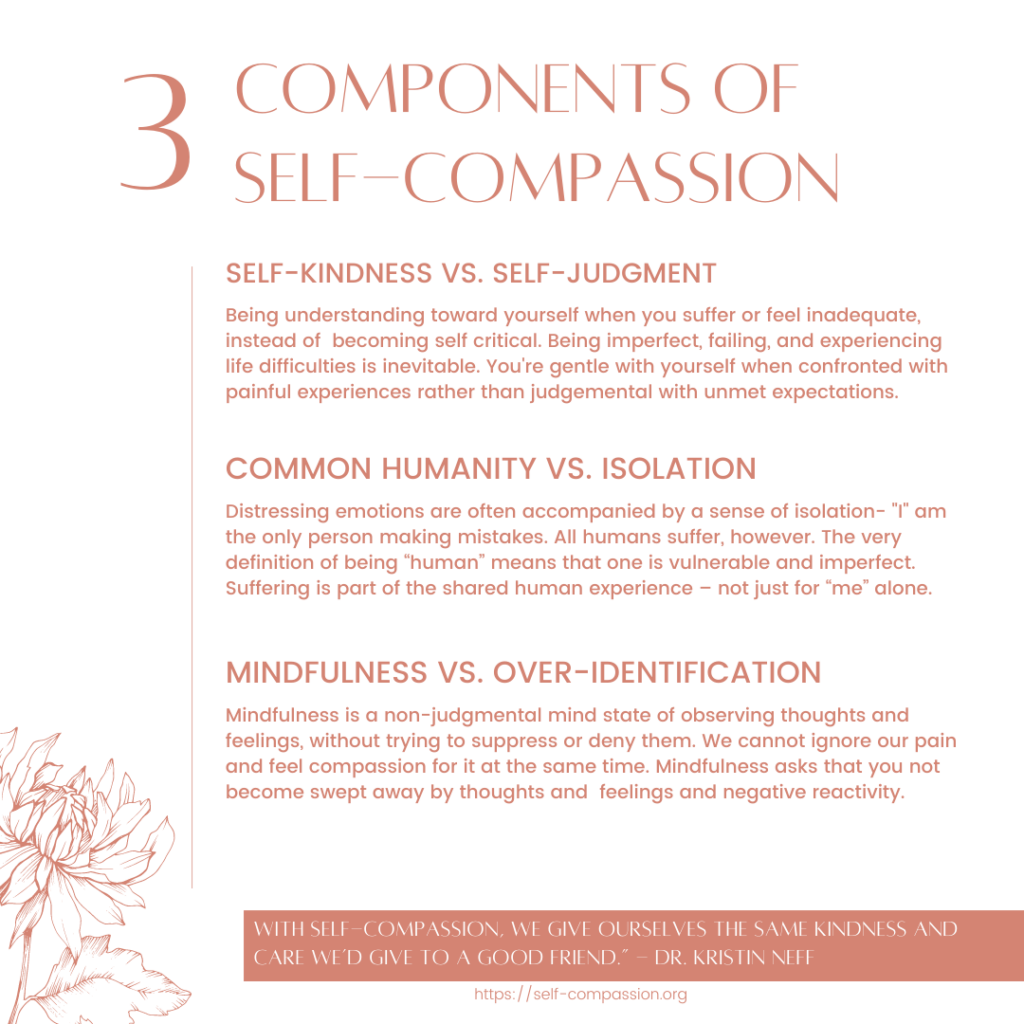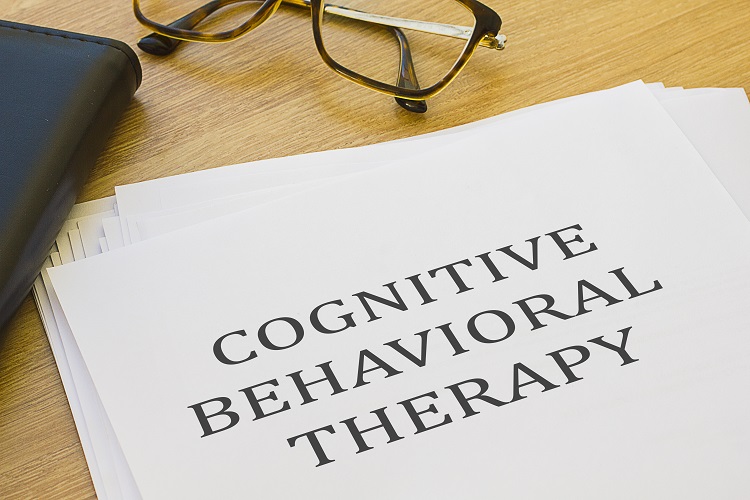Individual Therapy
“With self-compassion, we give ourselves the same
kindness and care we’d give to a good friend.”
– Dr. Kristin Neff
Self Compassion and Mindfulness Based Therapy
Most recently, “Fierce Self-Compassion” has emerged in the literature, as a way to help women “reclaim their power”. In moments of suffering, sometimes we need to accept ourselves and our imperfections. Other moments call for action. Dr. Neff writes, “If tender self-compassion is metaphorically like a parent soothing her crying child, fierce self-compassion is like Momma Bear who ferociously protects her cubs when threatened, or catches fish to feed them, or moves them to a new territory with better resources. Just as tenderness can be turned inward so that we nurture and care for ourselves, the fierce energy of Momma Bear can also be turned inward to stand up for ourselves.”
Self-compassion therapy teaches:
- This is a really hard moment right now. How can I take care of myself?
- What do I need right now? What do I need to add, take away, or maintain to get through this moment of suffering?
- I don’t need to be so hard on myself right now. This was an honest mistake, and nobody is perfect (despite what social media may often portray).
- I’m human, and that’s ok. I’m still learning.
- Things didn’t go the way I wanted today. I recognize everyone’s been here before, and I accept that.
- I’m ok with my limitations, and I accept I can’t do it all.
Self-compassion therapy is NOT:
- Pity – It’s not about becoming consumed with your own problems, leading you to feel more isolated than before.
- Overindulgence – It’s not about letting yourself go, numbing yourself, or self-medicating (e.g., abusing drugs, over-eating, excessive alcohol use, “retail therapy”). Shaming yourself into better behaviors doesn’t tend to produce effective outcomes.
- Self-esteem – It’s not about your sense of perceived value or how others view you. Although self-esteem is an important component of your mental health, it is often tied to self-evaluations compared to others. Research indicates that in comparison to self-esteem, self-compassion is associated with greater emotional resilience, more accurate self-concepts, engaging in a more caring and thoughtful way in your relationships, as well as less narcissism and reactive anger.

For more information, please visit Self Compassion with Dr. Kristin Neff
Cognitive Behavioral Therapy
Situation: Mom loses temper with her child. Thoughts: “I’m a bad mom.” Feelings: Guilt, sadness, overwhelm, shame. Behaviors: Withdraw, isolate, argue with their partner.


Cognitive Behavioral Therapy (CBT) focuses on reducing distressing emotions and unhelpful behaviors through challenging negative or irrational beliefs. It helps you learn skills to challenge and change patterns of negative thinking in order to promote positive feelings and behavioral changes.
When a mother loses her temper and yells at her child, instead of believing “I’m a bad mom”, she recognizes the situation for what it truly is – a moment in time where her patience has run out and she needs to recharge. She is able to challenge her negative assumption about her worth as a mother and decides to try better next time. She may experience a fleeting moment of sadness, but her negative emotions don’t take over in an all-consuming way and she’s able to repair the relationship with her child through an honest conversation and authentic apology. Together, they are able to enjoy the rest of the day.
When a mother is caught in her own distressing emotions, her perception of reality is distorted. She truly believes she is a bad mother at that moment and this single thought can disrupt an entire day, or cause an even longer period of suffering. CBT works to identify those harmful thoughts, assess the accuracy, and replace them with more adaptive, healthy thinking strategies.
In our work together, I may suggest exercises to help you begin observing and recognizing your thought patterns so you can begin practicing and applying the skills you’re learning to real-life situations.


Common CBT exercises include:
- Examining your personal story, which may be contributing to self-doubt and developing increased confidence in your own abilities.
- Confronting fears, rather than using avoidance and other defense mechanisms.
- Using role plays to prepare for future challenges.
- Developing skills to calm your mind and body.
CBT works because we first focus on the repeated practice of challenging assumptions – “What’s the evidence for and against this thought?” “Is it possible that another way of thinking is more accurate?” Next, we problem solve. If your thoughts are rooted in reality, we figure out a way to make your challenges more manageable. Finally, we work to accept and deal with that which is out of your control so your thoughts are no longer controlling you. For more information, please visit the American Psychological Association.
EMDR Therapy
EMDR (Eye Movement Desensitization and Reprocessing) is a psychotherapy that enables people to heal from the symptoms and emotional distress that are the result of disturbing life experiences. With the help of EMDR, you will be able to understand how your past experiences are contributing to today’s problems. This treatment can be used to heal from various kinds of trauma (traumatic birth experiences, childhood abuse, sexual abuse, challenging past relationships with your own caregivers, and more)
Repeated studies show that by using EMDR therapy people can experience the benefits of psychotherapy that once took years to make a difference. It is widely assumed that severe emotional pain requires a long time to heal.


EMDR therapy shows that the mind can in fact heal from psychological trauma much as the body recovers from physical trauma. When you cut your hand, your body works to close the wound. If a foreign object or repeated injury irritates the wound, it festers and causes pain. Once the block is removed, healing resumes. EMDR therapy demonstrates that a similar sequence of events occurs with mental processes.
The brain’s information processing system naturally moves toward mental health. If the system is blocked or imbalanced by the impact of a disturbing event, the emotional wound festers and can cause intense suffering. Once the block is removed, healing resumes. Using the detailed protocols and procedures learned in EMDR therapy training sessions, clinicians help clients activate their natural healing processes.
There has been so much research on EMDR therapy that it is now recognized as an effective form of treatment for trauma and other disturbing experiences by organizations such as the American Psychiatric Association, the World Health Organization and the Department of Defense.
Given the worldwide recognition as an effective treatment of trauma, you can easily see how EMDR therapy would be effective in treating the “everyday” memories that are the reason people have low self-esteem, feelings of powerlessness, and all the myriad problems that bring them in for therapy. Over 100,000 clinicians throughout the world use the therapy. Millions of people have been treated successfully over the past 25 years. – from the EMDR Institute
For more information and to better understand this treatment modality, please visit the EMDR Institute.


